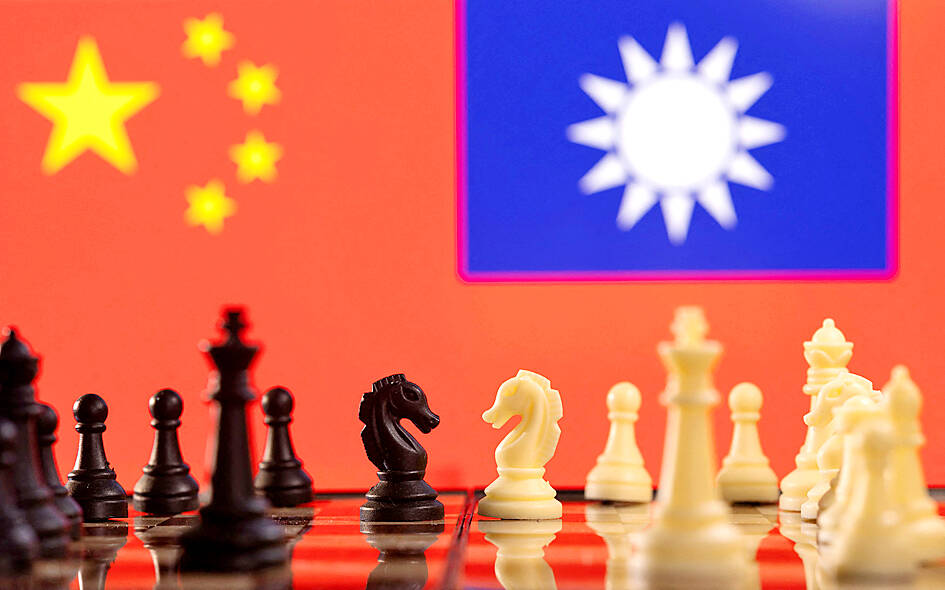Democratic Progressive Party (DPP) Legislator Puma Shen (沈伯洋) and other lawmakers have proposed amendments to the Criminal Code defining four crimes of collusion with foreign powers.
As collusion, which is currently not well-defined under the law, carries a severe penalty, judges tend not to invoke it, Shen said.
After consulting with the National Security Bureau, he and other DPP members have proposed defining four types of criminal behavior that would fall under the category of collusion.

Chess pieces stand in front of the flags of China, left, and Taiwan in an illustration photograph taken on Jan. 25, 2022.
Photo: Reuters
They are publicly declaring or recognizing the right of a foreign power to exercise rule over the Republic of China (ROC); failing to perform one’s official duties as a civil servant of the ROC or committing acts that contravene those duties at the request of a foreign power; assisting a foreign power in attempting to exercise authority over the sovereign territory of the ROC; and endorsing the claims of a foreign power of sovereignty over the territory of the ROC, whether through participation in meetings, signing of petitions or other means.
The draft also sets out hierarchical penalties for different targets, mainly civil servants.
Highest in the hierarchy is the president and vice president, followed by elected public officials; heads and deputy heads of agencies; high-ranking members of the Executive Yuan; justices, examination committee members and members of supervisory committees; and diplomats.
The hierarchy also includes noncommissioned officers and other military personnel, heads of political parties, police officers, Coast Guard Administration personnel, customs officers, firefighters, civil defense committee members, and those in charge of the operations of critical infrastructure, among others.
Civil servants found guilty of collusion could receive up to life imprisonment, while non-public servants would face fixed prison terms of one to seven years, Shen said.
Not all actions perceived as “united front” activity would be punishable under the amendment, he said.
“There are many artists in Taiwan this year who have made pro-China statements, but those artists operate in a free market after all, and it is their personal freedom to pursue opportunities in China,” he said.
However, professors or government officials making such statements are at higher risk of facing legal consequences, he said.
Lawmakers are concerned that current laws encompass a gray area, which China would take advantage of, he said, adding that further revisions would be likely.
Separately, DPP Legislator Chiu Chih-wei (邱志偉) has proposed an amendment to Article 8 of the Anti-Infiltration Act (反滲透法), which would call for the Constitutional Court to rule on the dissolution of a political party in the event that the party or its key members commit acts that contravene the Constitution, disrupt social order or affect national security.
Source: Taipei Times - 2024/10/21




















